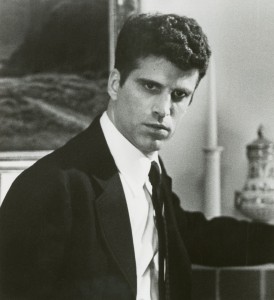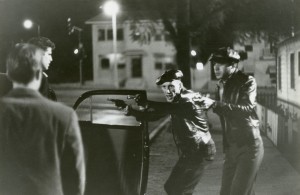by Barb Lentz.
The five movies Bob provided for me from which to choose were these:
The African Queen (1951)
Cartouche (1962)
Laura (1944)
The Onion Field (1979)
Reckless (1935)
I chose The Onion Field because it had the most interesting title, and we had not seen a crime drama since The Naked City. I like the cast, particularly James Woods and Ted Danson, and I thought it would be very good.

What I did not expect was that it would be so disturbing. This is not a movie I need to see again. While it is a very well acted story and has well-drawn characters that you feel strongly about, and does not sensationalize its drama, it is difficult to sit through. I appreciate how well made it is, but its violence is so tragic and unnecessary. So many lives were affected, all for the worse, all because a hold-up man thought he knew something that he really did not. The long, drawn out courtroom scenes that followed the crime are truthful and realistic, but they aren’t as dramatic as the crime itself, and when the killers don’t receive just punishment, the movie ends without a traditional payoff.
Most of what I like involves the characters. The movie does well establishing who these people are and where they are headed. It is clear from the start that the cops will cross paths with the crooks in an encounter that will change everything. I also appreciate that the story continues on past the crime to show the consequences of the killing for everyone involved. I didn’t like that the crooks are able to work the legal system to their advantage, and that it took so long for the case to finally be judged, but I understand those aspects are supposed to be troubling and maddening. In that respect the movie was quite successful.
It is telling that the story involves two cops new to each other. We get to learn about Ian Campbell (Ted Danson) and Karl Hettinger (John Savage) as they do. It’s almost like a couple dating, getting to know each other, and deciding whether to keep going out or not; it has that same kind of feeling. Each man is tentative and cautious about saying too much or revealing something too intimate to the other, as if the wrong divulgence might be something that cannot be taken back. And then, before they can really relate to each other, they are suddenly in a life or death situation together.
The film also questions what the right decision really is. After the ordeal Hettinger is forced to relive the events of that night over and over — not just in court but by his colleagues and peers on the force. They analyze and criticize what occurred, and try to determine a verdict without addressing the human, subjective element. Situations vary depending on the people involved. People are not textbooks, and you cannot expect everyone to react the way that is prescribed. That’s what training is for, but even specialized training cannot eliminate beliefs and fears and instincts that vary from person to person. The movie recognizes this, even if the police do not.
My top five moments in the movie are:
1. When the story begins to intersect. We meet the cops, we meet the criminals, and we know they will cross paths. As that meeting nears the tension mounts and the characters’ relationships become more meaningful.

2. When Ian Campbell is first introduced, playing the bagpipes in an unused cell block. The sound has a haunting echo quality and demonstrates that the story will involve jail. It’s good foreshadowing that comes full circle at the very end, when Campbell’s mother talks to the boy at the high school music festival who reminds her of her son.
3. When Hettinger’s wife Helen (Dianne Hull) supports him through all of the personal trauma he experiences. She stands by him and is the voice of reason for him in his darkest hours, even supporting them when he has trouble finding a good job. When he is caught shoplifting, she doesn’t run away as many spouses would; she carries some of his burden and tries to help as best she can.
4. When the beat cop (Richard Herd) tells the other cops that Hettinger and Campbell shouldn’t be judged too harshly for their actions that night. He seems like a tough street cop, yet he is the only one who admits to fears and doubts, believing that any life and death decisions made under such duress should not be questioned. Moments later his supervisor says the exact opposite, demanding only one type of response.
5. When the assistant district attorney (David Huffman) resigns over his frustration with the legal system. It is a perfectly understandable and appropriate response, and he seems like the only person with the common sense to see how crazy the system has become.
Is The Onion Field a classic? I’m not sure. It is very well made, with excellent acting by John Savage and especially James Woods, who is incredibly effective. It has some of the same components of The Naked City, the first “classic” movie that Bob and I have seen on this adventure, and the same semi-documentary approach to the material. It is much darker, however, with little humor and too many scenes where death seems inevitable, such as the death row sequence where a man cuts himself with a shiv ahead of his own execution, or the frightening sequence where Hettinger cannot stand hearing his baby cry. It is a tough film to watch; I do not need to ever see it again. With all these aspects, I don’t think I can call it a classic.
BRL 9 August 2014.
The Onion Field (September 19, 1979) Black Marble Productions / Avco Embassy
Directed by Harold Becker. Produced by Walter Coblenz.
Screenplay by Joseph Wambaugh, based upon his book.
Principal Cast (character, performer):
Detective Karl Hettinger John Savage
Gregory Powell James Woods
Jimmy Lee Smith Franklyn Seales
Detective Ian Campbell Ted Danson
Detective Sergeant Pierce Brooks Ronny Cox
District Attorney Philip Halpin David Huffman
Helen Hettinger Dianne Hull
Chrissie Campbell Priscilla Pointer
Powell’s girlfriend Beege Barkette
Billy Lee Weaver
Jailhouse lawyer Christopher Lloyd
Lawyer # 2 Pat Corley
122 minutes. Color. Widescreen (1.85:1). Rated R.
